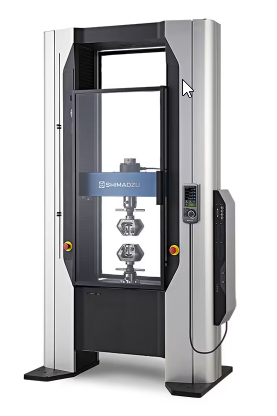Universal testing machine
Universal Testing Machine - history and present
The most common testing machine design used today will be described next. Generally speaking, a testing machine is a device consisting of two vertical fixed columns connected at the top by a rigid crossbar, and at the bottom they are also connected by a rigid crossbar, so that they then form a rigid frame (panel). In the middle of this frame is a crossbar which moves up and down. The movement of the crossbar is provided by either hydraulic oil - then it is a piston or an electric motor, where the crossbar is mounted on two threaded bolts (see picture).

In most cases, Universal Testing Machines are manufactured in vertical form. Only in exceptional cases are they produced in horizontal form, either in the case of small machines that fit on a table or, conversely, large machines that test, for example, ropes several metres long.
Hydraulic machines are used to exert larger tensile/compressive forces - from 200kN to several MN or for dynamic loading - cyclic loading of samples and whole components.
Electromechanical machines, due to the proliferation of ball screws, all other motion screws have virtually ceased to be used in testing machines - e.g. trapezoidal threaded (formerly the domain of DDR).
For smaller forces up to approx. 5kN, Table-top testing instrument (single column machines) are used. Their advantage is the need for less space, but on the other hand it is not possible to equip them with any larger accessories. For example, a chamber, a larger test fixture, etc.
Universal testing machines of European origin
Testing machines of mainly East German origin were imported to our countries - WPM Werkstoffprüfsysteme Leipzig - the first testing machine designed in 1890 for measuring the strength of textile fibres. These machines are nowadays (thankfully) being replaced.
However, testing machines were also imported from the West. These were mainly tensile tester of the brand Amsler - later Roell and Zwick / Roell respectively.
The Swiss Jacob Amsler-Laffon built the first electromechanical testing machine in 1854, followed by a hydraulic testing machine in 1880. Amsler, like Mannheim Machine Factory (MFL - first testing machine 1870) was taken over by Roell in the 1980s, which was founded by Messrs. Roell and Korthaus in 1921. Zwick was founded in 1935 and merged with Roell in 1992. This created the brand Zwick / Roell, which is still known today.
Overseas-made tensile testing machines
In the 1980s, tensile testing machines from England were imported from the West, mainly for institutions / companies of national importance.
English Instron testing machines, which were supplied to steelworks, steelworks, research institutes - aerospace etc.
Instron as a company was founded in 1946 in MIT Massachusetts by Messrs. Hindmann and Burr because the machines used so far were not accurate enough to determine mechanical properties in tensile tests of new materials e.g. nylon. These materials began to be used in World War II for parachutes and were also used in the Normandy landings.
In 1960 a European branch was established in the UK. Since 2005, Instron has been part of the American ITW group, which also includes MTS at the time of the acquisition.
Testing tensile machines from the Land of the Rising Sun

The last company with more than a century of tradition in the production of testing machines is the Japanese company Shimadzu. Shimadzu was founded in 1875 by Mr. Genzo Shimadzu and subsequently taken over by his son.
The first Shimadzu tensile testing machine dates back to 1917. In the 1950s, the tensile tester machines were given a curve record on paper, hence the name of the Autograph model series - the automatic recording machine still in use today. Since recording the force-extension curve is not a big science today, the abbreviated name of the AG series is used.
Shimadzu continues to innovate its tensile testing machine model series, and the technical leader - the best tensile tester machine - is the AGX-V model series, which won the iF Design Award in 2020.
Shimadzu has been active in Europe since 1968 and since then the brand's tensile and testing machines have been imported to the Czech Republic and Slovakia.
The range of Shimadzu testing machines and other products in the Main menu.